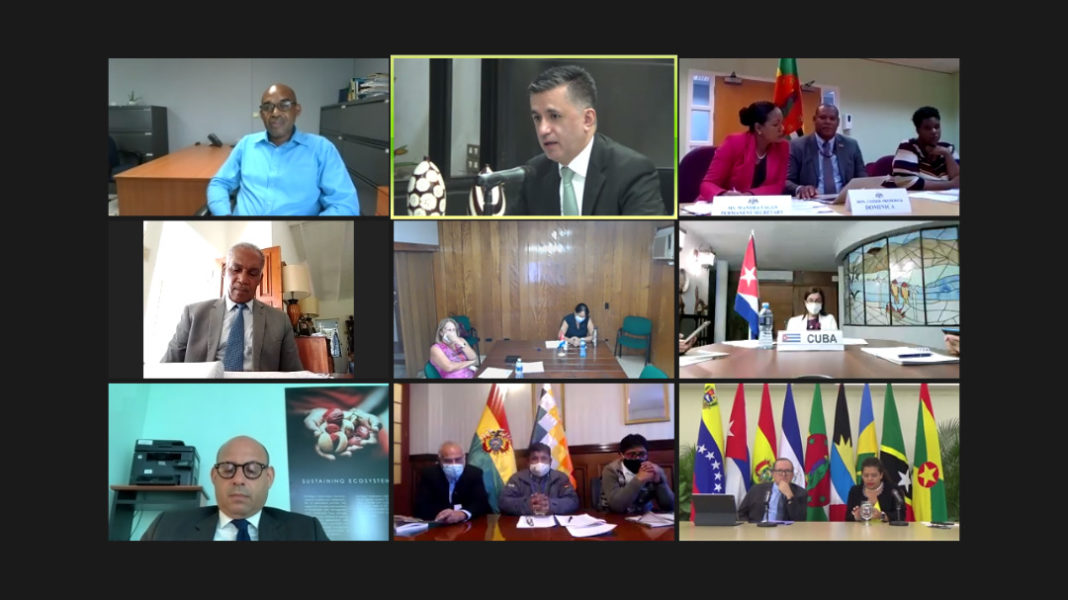The ministers and high-level authorities on the Environment of the Bolivarian Alliance for the Peoples of Our America – Peoples’ Trade Treaty (ALBA-TCP) held a virtual meeting on Wednesday to debate proposals and actions to fight climate change.
The meeting was headed by the ALBA-TCP Executive Secretary SachaLlorenti, who pointed out that the “environmental crisis is the consequence of the unsustainable production patterns of developed countries,” hence the importance of strengthening Eco-socialism as a method based on the respect for the environment and the Pachamama.
Llorenti explained that the meeting enabled to define a roadmap to face the challenges ahead of the 2021 UN Climate Change Conference (COP26), to be held from October 31st to November 12thin Glasgow, Scotland.
The ALBA-TCP Executive Secretary stressed the need of “creating an ALBA-TCP Youth and Climate Change Group to coordinate joint actions on priority environmental issues towards the Youth Conference on Climate Change.”
Venezuela’s People’s Power Minister for Eco-socialism, Josué Alejandro Lorca, along with the Minister for Water Management, Evelyn Vásquez, reaffirmed Venezuela’s will to share its experience in forest fire management with the ALBA-TCP countries.
Regarding the warning issued by scientists at the Intergovernmental Panel on Climate Change (IPCC) about the upcoming scenario mankind will have to face due to the increase in temperature and the loss of biological diversity, Lorca stressed the importance of a joint agenda of actions that the Alliance will take to face environmental challenges.
Cuba’s Minister of Science, Technology and the Environment, Elba Pérez, highlighted that her country pleads for a greater use of science and innovation in environmental management.
Likewise, Pérez stressed the need of implementing new policies to counter climate change.
Also, Bolivia’s Minister of the Environment and Water, Juan Santos Cruz, said that “the climate crisis is one of the great challenges of our times; it threatens life on the planet as a consequence of the capitalist system.”
Santos Cruz denounced that developed countries are transferring the burden of the climate crisis to developing countries; rejected the market’s and the green economy’s vision, and stated that Bolivia is willing to convene a third Conference of the Peoples – with the ALBA-TCP support – to discuss the proposal towards the COP26.
The Bolivian minister also urged to fulfill promises to finance and promote the developing countries’ efforts.
“Our peoples are tired of hypocrisy regarding the Mother Earth, unfulfilled promises (…) ALBA-TCP is a mechanism that can guide the Paris Agreement,” said Cruz.
Javier Gutiérrez, Nicaragua’s Minister of the Environment, pointed out that the current context is critical since, in addition to the climate crisis, the pandemic and the illegal implementation of unilateral coercive measures undermine efforts against climate change.
In this regard, Gutiérrez stressed “it is necessary to reaffirm the mandates of the “Reencuentro con la Pachamama” Summit, defend climate justice and reparation and demand the eradication of unilateral coercive measures.”
The ALBA-TCP Meeting of Ministers and High-level Authorities on the Environment was also attended by representatives from Dominica, Saint Vincent and the Grenadines, Antigua and Barbuda. The representatives of the ALBA-TCP member countries agreed to create a technical team and spaces for the exchange of environmental scholars and experts to consolidate a proposaltowards COP26.
